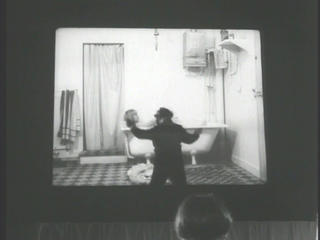Research Project B7. The Politics of Aesthetics in Western European Cinema
Head
Research Associates
Sarah-Mai Dang, M.A. / Dr. Bernhard Groß / Dr. Daniel Illger / Michael Lück, M.A. / Moritz Schumm, M.A. / Hanno Berger, M.A.
Student Assistants
Jasper Stratil / Christian Lippe
Objective
Around 1945, that is to say, in the early period of postwar Western European cinema, the expectation was widespread, that the film medium would generate a specific aesthetic mode of experience, one that would enable a new political culture in the wake of the disintegration of European society. After the fall of the iron curtain in 1990, this expectation was rearticulated in terms of "Politics of Aesthetics". In our research project, we examine the relationship between politics and the modalities of aesthetic experience in the West European post-war cinema. In its second period the project addresses impact oriented poetics of affect in genre cinema as a dominant factor in West European cinema.
Subproject 1: The realm of genre cinema experience
(Prof. Dr. Hermann Kappelhoff)
In this subproject, we will develop an approach in genre theory based on the relationship between the poetics of affect in genre cinema and reflexive film poetics that aim at the sensation of social conditions. On a preliminary premise we define genre as a specific experience evoked by aesthetic patterns. The focus is not on the function of ideology and myth production. Instead, genre is considered in relation to impact strategies that in recent studies have been described as emotionalizing practices.Another preliminary assumption is that the tension between art and entertainment is constitutive for the genre cinema, and can be studied as an historical dimension of genre.
Subproject 2: The West German cinema in the 50s and 60s
(Prof. Dr. Hermann Kappelhoff, Dr. Bernhard Groß, Sarah-Mai Dang, M.A., Michael Lück M.A.)
Shortly after the Second World War, a comprehensive genre film system developed in West Germany, which was dominated by successful German productions. Within this system a change took place in the early 1960s, in which particular genres (as the Heimatfilm) declined, while other genres (as the crime film) proliferated. In this subproject, we shall analyze the poetic concepts of the West German genre films. We shall examine how the reception forged by the change and interplay between the various poetic elements, could be refered to as a politicaly effective experience.
Subproject 3: The B-movie genre in Italy and Great Britain in the 50s and 60s
(Dr. Daniel Illger)
From the mid-1950s a new genre cinema appeared in Italy and Great Britain. It was formed in the B-sector production and had a similar profile in both countries, characterized by variations of horror and adventure films. In analyzing a selection of these B-movies, we shall provide the basis for a theoretical approach to the specific aesthetic mode of experience of the B-movie genre. On these premises, we shall examine the thesis that the B-genre evokes a community spirit (fan communities), and refer to the little-noticed relations bewteen British and Italian B-genre cinema and genre forms of the classical Hollywood cinema.The theoretical concept will serve as a reference point for assessing the historical and political implications of the B-movie genre. We shall adress the question whether and how a specific mode of experience which is based on a ‘idiosyncratic taste’ and a reflexive reference to historical genre patterns relates to the commonly alleged subversive dimension of the B-genre.
